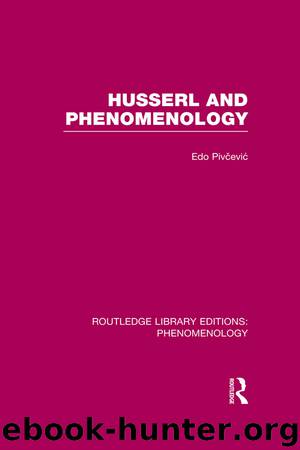Routledge Library Editions: Phenomenology by Routledge;

Author:Routledge;
Language: eng
Format: epub
ISBN: 3061411
Publisher: Routledge
Conceptual analysis
The most important statements by conceptual analytic philosophers on Freudian psychology occur in Wittgenstein's Lectures and Conversations on Aesthetics, Psychology and Religious Belief (1966), Peters’ The Concept of Motivation (1958) and Maclntyre's The Unconscious: A Conceptual Analysis (1960). It is with these three works that we shall be mainly concerned. However, it is worth pointing out that the number of brief discussions about Freud to be found in the work of many other conceptual analytic philosophers is quite large. Among these Hampshire's comments in Thought and Action (1959), Alexander (1955; 1962), Beck (1966), Toulmin (1949) and Wisdom (1957) ought to be mentioned. Wittgenstein, Peters and Maclntyre, broadly speaking, all criticise Freud for not being humanistic and for encouraging reductionist interpretations of his theories. But before we describe and analyse these criticisms it must be pointed out that Freud's ambiguous two-culture fence-sitting results in some ambiguity of interpretation by conceptual analysts. For instance, Hampshire and Beck portray Freud as a theorist who extended the use of humanistic and teleological terms like ‘purpose’, ‘desire’ and ‘wish’, albeit ‘unconscious’ varieties, to cover a lot more phenomena of human action and behaviour than would otherwise have been able to be conceptualised in this way.
Thus, for the major conceptual analytic commentators, Freudian psychology presents a deterministic picture of man. But for commentators such as Hampshire and Beck, Freudian psychology, while demonstrating that man is determined and hence unfree, also contributes to man's freedom by giving him this knowledge, so that he may act to minimise the effectiveness of the things that determine him.
Hampshire accepts that Freud's theories of the workings of the unconscious mind apply to all men, normal, neurotic or mad. And he accepts that they do not merely apply in a piecemeal and limited fashion to a clearly marked range of abnormal behaviour such as neuroticism. This is a point, as will be seen, upon which other commentators like Peters tend to equivocate. However, the universality of the Unconscious and the universality of its effectiveness, does not mean, as far as Hampshire is concerned, that people cannot know what they are doing and why they are doing it. It does not mean that people's conscious intentions and purposes are always and necessarily ineffective with regard to their actions and behaviour (Hampshire, 1959, pp. 133 and 179). Rather it means that we are not as free as we like to think we are; we are certainly not absolutely free. And further it means that we can increase our degree of freedom by increasing our knowledge about the extent and nature of the determining factors that affect us, and then by taking action to minimise these factors.
Hampshire seems to be implying here that Freudian therapy is a conscious form of liberation from the Unconscious. But Freudians could well object that this is not the case at all. Mere apprehension by the subject of the alleged existence and workings of unconscious wishes, and the subsequent New Year's resolution not to be affected by them ever again, is just too rational for Freudians.
Download
This site does not store any files on its server. We only index and link to content provided by other sites. Please contact the content providers to delete copyright contents if any and email us, we'll remove relevant links or contents immediately.
Rewire Your Anxious Brain by Catherine M. Pittman(18249)
Talking to Strangers by Malcolm Gladwell(12844)
The Art of Thinking Clearly by Rolf Dobelli(9886)
Mindhunter: Inside the FBI's Elite Serial Crime Unit by John E. Douglas & Mark Olshaker(8683)
Becoming Supernatural by Dr. Joe Dispenza(7823)
Change Your Questions, Change Your Life by Marilee Adams(7356)
The Road Less Traveled by M. Scott Peck(7265)
Nudge - Improving Decisions about Health, Wealth, and Happiness by Thaler Sunstein(7227)
The Lost Art of Listening by Michael P. Nichols(7150)
Mastermind: How to Think Like Sherlock Holmes by Maria Konnikova(6924)
Enlightenment Now: The Case for Reason, Science, Humanism, and Progress by Steven Pinker(6864)
Win Bigly by Scott Adams(6813)
The Way of Zen by Alan W. Watts(6280)
Daring Greatly by Brene Brown(6215)
Big Magic: Creative Living Beyond Fear by Elizabeth Gilbert(5336)
Grit by Angela Duckworth(5287)
Men In Love by Nancy Friday(4953)
Ego Is the Enemy by Ryan Holiday(4932)
Altered Sensations by David Pantalony(4858)
